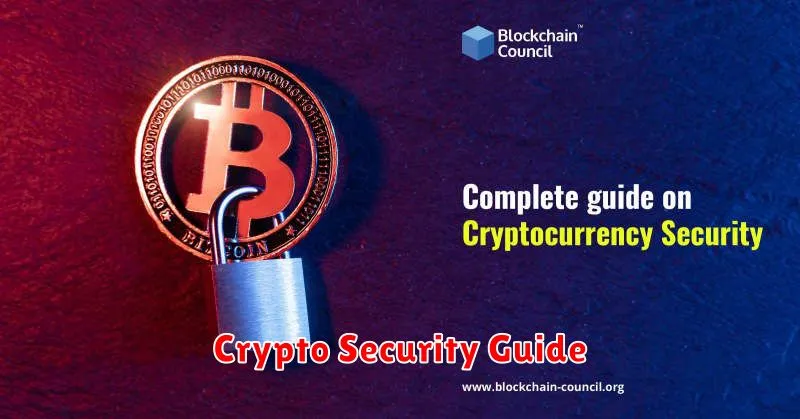Protecting your cryptocurrency investments is paramount in today’s volatile market. This article outlines five crucial tips to significantly enhance the security of your digital assets, helping you safeguard against hacks, phishing scams, and other potential threats. Learn how to bolster your crypto wallet security, implement robust password management strategies, and understand the importance of blockchain security best practices to confidently navigate the world of cryptocurrency trading and investing.
Use Hardware Wallets for Maximum Security
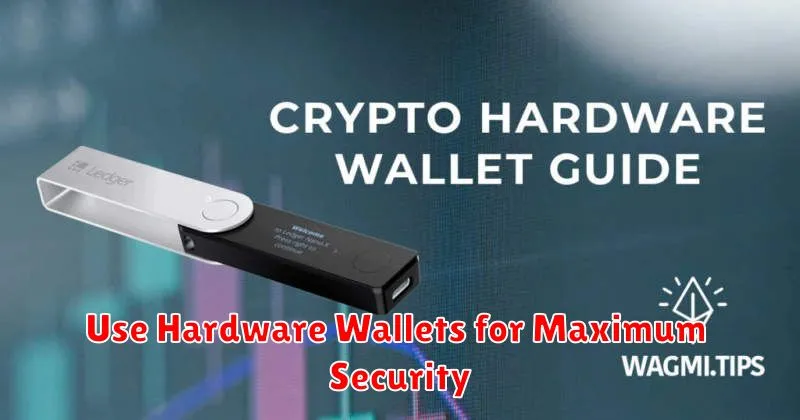
Hardware wallets offer the most secure way to store your cryptocurrency. Unlike software wallets, which are vulnerable to malware and hacking, hardware wallets store your private keys offline on a secure, dedicated device. This significantly reduces the risk of theft or loss due to online attacks.
These devices typically have a small screen and buttons for navigation, allowing you to authorize transactions securely. Reputable brands employ robust security measures, including tamper-proof casing and secure element chips, making them extremely difficult to compromise. This physical separation of your private keys from the internet is crucial for maintaining control and protecting your assets.
Choosing a well-established and trusted brand is paramount when selecting a hardware wallet. Look for devices with strong reputations and positive user reviews. Properly securing your seed phrase (a crucial backup code) is also critical, ensuring you can recover your funds if the device is lost or damaged.
By using a hardware wallet, you significantly enhance the security of your cryptocurrency holdings and reduce your vulnerability to online threats. The added layer of protection offered by these devices makes them a worthwhile investment for anyone serious about securing their digital assets.
Enable Two-Factor Authentication (2FA)
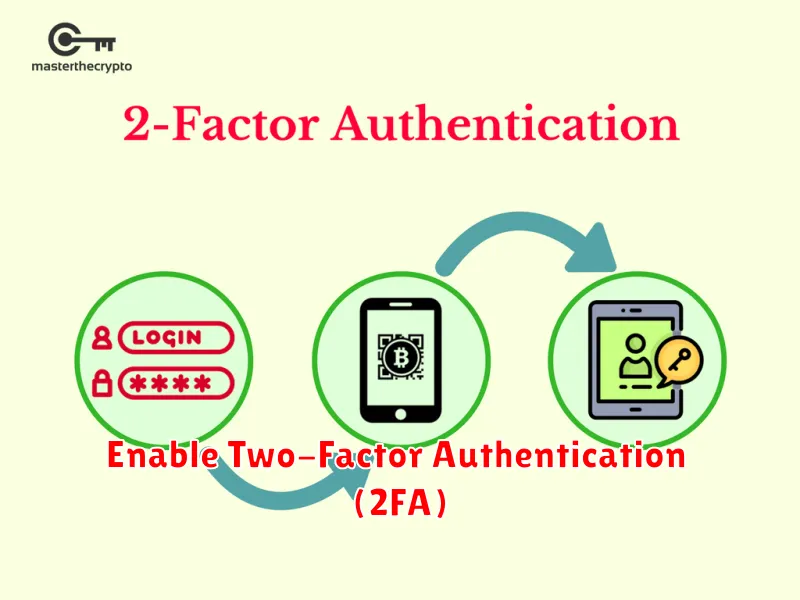
Two-Factor Authentication (2FA) adds an extra layer of security to your cryptocurrency accounts. It requires not only your password but also a second form of verification, such as a code from an authenticator app or a text message to your phone.
Enabling 2FA significantly reduces the risk of unauthorized access, even if your password is compromised. This is a crucial step in protecting your cryptocurrency assets from theft or loss.
Most cryptocurrency exchanges and wallets offer 2FA as a readily available security feature. Take advantage of this critical security measure immediately to enhance the protection of your digital holdings.
Avoid Sharing Your Private Keys
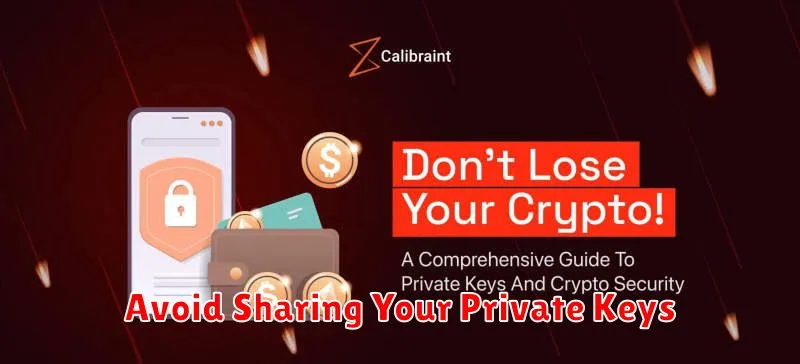
Your private keys are the passwords to your cryptocurrency. They grant complete control over your digital assets. Never share them with anyone, under any circumstances. This includes friends, family, or even customer support representatives from cryptocurrency exchanges or platforms. Legitimate entities will never request your private keys.
Phishing scams and malicious actors often try to trick you into revealing your private keys. Be wary of unsolicited emails, messages, or phone calls requesting this information. If you suspect a scam, immediately report it to the appropriate authorities and your cryptocurrency exchange.
Compromised private keys result in the irrevocable loss of your cryptocurrency. There is no recovery process. Protecting your private keys is paramount to securing your cryptocurrency assets.
Be Cautious with Phishing Attempts
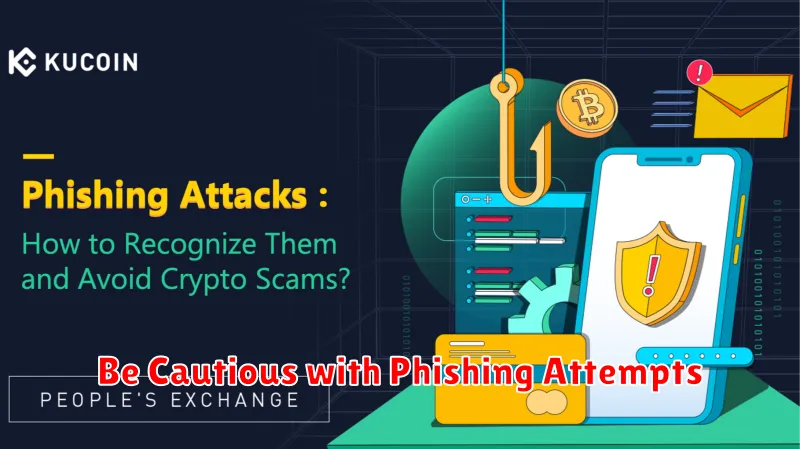
Phishing attacks are a major threat to cryptocurrency users. Scammers often impersonate legitimate exchanges or projects to trick you into revealing your private keys, seed phrases, or other sensitive information. They may use deceptive emails, websites, or even social media messages.
Be extremely wary of unsolicited communications requesting your login credentials or other personal data. Never click on links or download attachments from unknown sources. Always verify the authenticity of any communication by checking the sender’s email address and website URL carefully. Legitimate organizations will rarely ask for this information via email or unsolicited messages.
Legitimate cryptocurrency platforms will never ask for your private keys or seed phrase. If you receive a request for this information, it is almost certainly a phishing attempt. Report any suspicious activity to the relevant platform immediately.
Strengthening your password security and enabling two-factor authentication (2FA) on all your cryptocurrency accounts significantly reduces your vulnerability to phishing attacks. Consider using a password manager to generate and securely store strong, unique passwords.
Regularly review your account activity for any unauthorized transactions. Quick detection of suspicious activity can help you mitigate potential losses from successful phishing attempts. Remember, vigilance is your best defense against these sophisticated attacks.
Backup Your Wallet Regularly
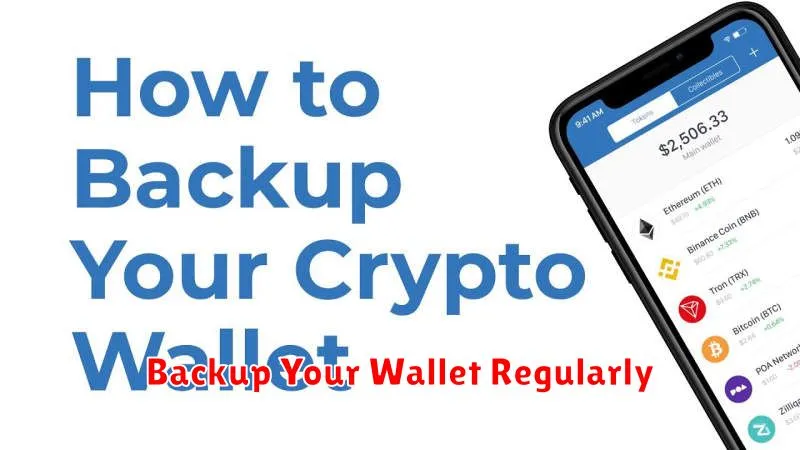
Regularly backing up your cryptocurrency wallet is crucial for protecting your assets. A compromised or lost wallet can mean the irreversible loss of your funds.
Choose a secure backup method. This could involve storing your seed phrase (a list of words that allows you to recover your wallet) offline in a safe place, using a hardware wallet with its own backup mechanisms, or employing a reputable, encrypted cloud storage solution.
Never store your backup digitally on your computer or any device connected to the internet. This leaves you vulnerable to hacking and malware.
Multiple backups are recommended. Store your seed phrase or wallet backup in several different, secure locations. Consider using a safety deposit box, or splitting the seed phrase across multiple physical locations.
Test your backup regularly. Periodically attempt restoring your wallet from your backup to ensure it’s functional and that you understand the process. This will give you confidence that your funds are recoverable in case of an emergency.
